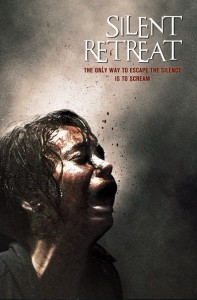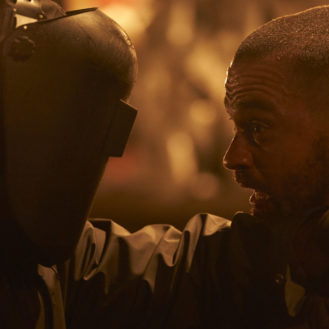I have a bit of history with Silent Retreat.
I caught Tricia Lee’s thriller at last year’s Toronto After Dark Film Festival where it received its fair amount of warm reception. Though the filmmaker was clear about the film’s intentions in a post-Q&A, it was a pick at the festival that really rubbed me the wrong way.
The flick’s primary problem was that it was dramatically overscored. It’s smothering music told the audience how they should be feeling throughout each scene. A murmuring, humming baseline is expected from a thriller/horror like Silent Retreat, but the movie wasn’t letting the viewer have any organic feelings towards it. Nonetheless, the film won the award for “Best Canadian First Feature” at the festival.
My negative review came out, made its rounds, and I never heard of Silent Retreat again. I ended up keeping in contact with Lee, however. Shortly after I saw Silent Retreat, I watched her other Lee feature called Clean Break – I really enjoyed it. The indie showed that Lee could have a balance between characters, garner memorable performances out of her actors, all while packing in lots of bloody thrills. It propped me up on the fence wondering if the filmmaker’s future work would take the shape of Clean Break rather than Silent Retreat.
Fast forward months later to present day. I receive word that Silent Retreat is getting a brief theatrical run. I contacted Lee and asked if this would be the same version that played at Toronto After Dark. She responded with a “yes” and informed me that the sound had been worked on. Curious and enticed, a second trip to the ominous girls camp was in order.
Even if the music has been controlled, Silent Retreat still hits those same problematic bumps. Tonally, the thing is heavier than it should be and its blunt allegory for suppressed feminism is louder than ever.
These flaws are hang-ups that first-time filmmakers and first-time screenwriters run into often when they’re trying to figure out how subtle they should be.
A director has to know how and when aggressive intensities should spike up and carefully handle their outcomes. Lee’s strategy, however, is to have the entire film unstoppably aggressive which is why Silent Retreat always feels like a movie that’s going 30 km past the speed limit. And, if screenwriter Corey Brown wishes to have an underlining meaning, he needs to take a more cunning route rather than having his villains snarl their motivations out loud.
Silent Retreat never takes its time to scout the environment or for characters to soak in what’s going on; despite the film taking place at a camp where no one has anything to do but reflect. Even the performances I thought were effective the first time around (including Robert Nolan’s creepy turn as the retreat’s doctor) have lost a frightening or panicked quality to them since they all appear to be one-note.
I still think Silent Retreat would’ve benefited greatly if it took a more psychological approach and let each move simmer to a tense boil. It would’ve allowed the film’s lead Janey (played by Chelsea Jenish) to generate paranoia and anxiety from the lack of human interaction. Additionally, Lee’s creature could’ve been slowly utilized throughout while toying with its manifestation. It’d be much like how Yonah Lewis and Calvin Thomas executed these developmental strokes in The Oxbow Cure, a movie much scarier and meaningful than Silent Retreat.
I’m glad I gave Silent Retreat a second go. The re-watch may have maintained its messiness and possibly made me unhappier towards the movie, but it made me appreciate more than before the talent I had seen Tricia Lee carry out in other work.





Leave a comment